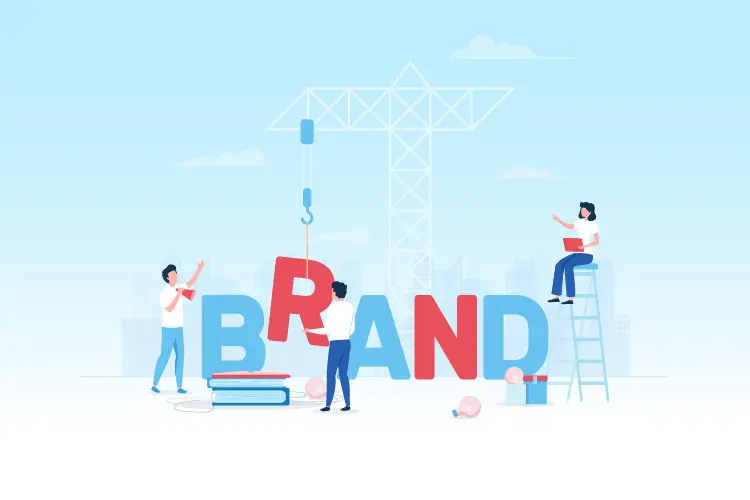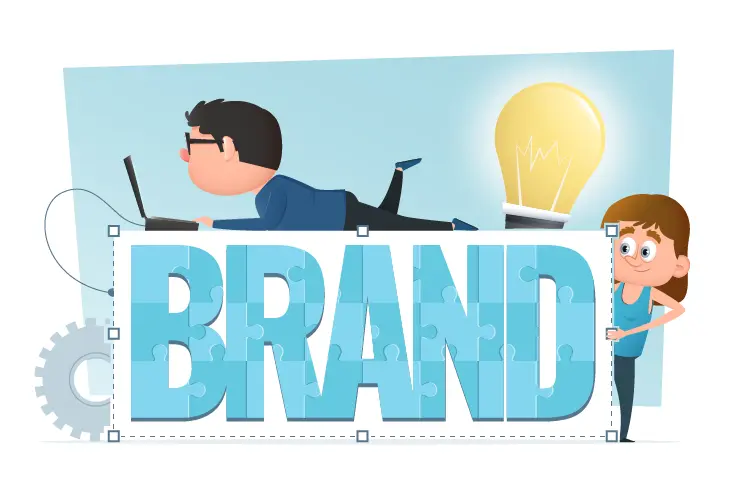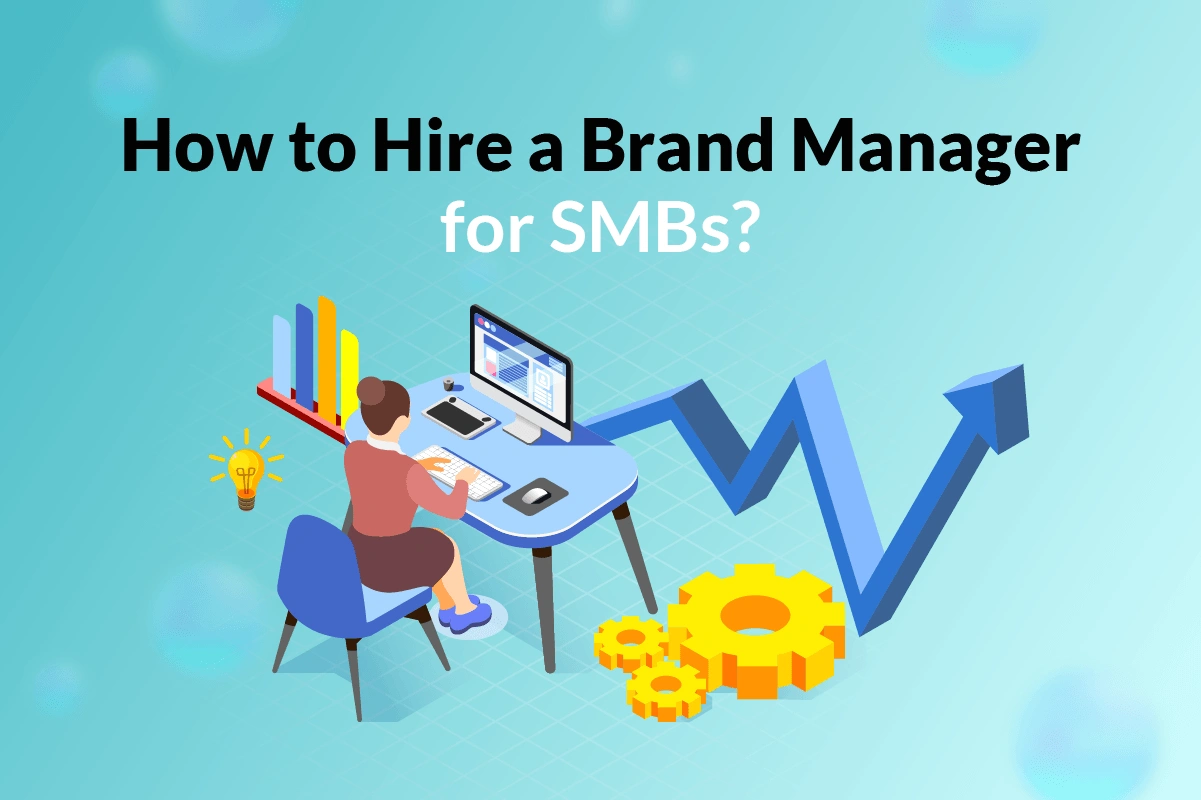Recent studies have revealed that an open company branding position severely reduces brand’s strength by 18%, with recovery often taking about seven weeks. In this context, the role of a brand manager becomes important to whether a company achieves its goals or misses them.
A proficient brand manager must possess the foresight to predict business and economic trends, matching them with the company’s trajectory over a 5-10 year period. However, finding a skilled brand manager can be difficult. It requires a nuanced understanding of the market and a keen eye for talent that aligns with your company’s long-term vision and objectives.
This comprehensive guide teaches you how to hire a brand manager, ensuring you find a candidate who navigates both the good and challenging times, steering your business towards sustained growth.
- Define Key Priorities from Typical Brand Manager Responsibilities
- Refine Job Requirements of a Brand Manager
- Showcase Job Benefits for a Brand Manager Position
- Set Competitive Salary Ranges for the Brand Manager Role
- Publish Your Job Opening Where Your Ideal Candidate Will See It
- Conduct Effective Interviews
- Create and Finalize the Offer
- FAQs About Hiring a Brand Manager
- Assisting Your Business to Growth
Define Key Priorities from Typical Brand Manager Responsibilities
A brand manager holds a key role in an organization, overseeing brand strategies and ensuring the brand’s success and growth. Here’s a breakdown of the core responsibilities of a brand manager:
- Brand Strategy Development:
- Crafting the brand’s long-term vision and mission.
- Developing strategies to position the brand effectively in the market.
- Identifying target audiences and tailoring branding efforts to resonate with them.
- Establishing brand guidelines to ensure consistency across all channels and communications.
- Market Research:
- Conducting ongoing thorough research of market trends, consumer behavior, and competitive landscapes.
- Analyzing data to gain insights into customer preferences and needs.
- Utilizing research findings to inform product development.
- Keeping abreast of industry changes and adapting strategies accordingly.

- Campaign Management:
- Planning and executing marketing campaigns to promote the brand.
- Coordinating with various departments (like Sales, PR, and Digital Marketing) to ensure a cohesive campaign execution.
- Measuring campaign performance and making adjustments based on analytics and feedback.
- Innovating and experimenting with new campaign ideas to engage audiences and boost brand visibility.
- Team Coordination:
- Leading and motivating the brand management team to achieve strategic goals.
- Facilitating collaboration between team members and other departments.
- Ensuring clear communication of brand strategies and objectives to the team and company.
- Providing guidance and feedback to foster team development and success.
Each of these responsibilities requires a unique blend of creativity, analytical thinking, and leadership skills. A brand manager proficient in these areas paves the way for a brand’s success.
Refine Job Requirements of a Brand Manager
For SMBs seeking to hire a brand manager, providing detailed job requirements attracts strong resumes and candidates who will add value to the workplace, fostering a productive work environment. Here’s an overview of the skills and why they matter.
- Degree in Marketing or Related Field:
- Importance: A formal education in marketing or a related field provides a foundational understanding of core marketing principles, consumer behavior, and market dynamics. Many certification programs have been established graduating very talented marketing candidates, as well.
- Benefits: Equips the brand manager with theoretical knowledge and frameworks needed to build effective brand strategies. This provides understanding of the complexities of branding in various markets and consumer segments.

- Years of Experience:
- Importance: A minimum of 5 years of experience ensures the candidate has practical knowledge and real-world insights in marketing strategies.
- Benefits: Experienced brand managers are likely to have a proven track record of successful campaigns and strategies. They bring a wealth of industry knowledge, can foresee potential challenges, and are typically more adept at navigating the nuanced world of brand management.
- Digital Marketing Proficiency:
- Importance: Digital marketing expertise helps the brand manager communicate and integrate their strategy with digital marketing objectives.
- Benefits: A brand manager with digital marketing skills is capable of using online platforms for brand promotion, applying SEO, social media, and content marketing techniques, and analyzing digital data to refine strategies.
- Creative Thinking:
- Importance: Creative thinking enables a brand manager to devise innovative and captivating brand strategies, essential for differentiation in competitive markets.
- Benefits: Creative thinking leads to innovative campaigns and fresh ideas that can captivate the target audience. For SMBs, this can mean the difference between blending in and standing out.
- Strong Communication Skills:
- Importance: Effective communication is key to conveying brand messages internally and externally.
- Benefits: Strong written and verbal communication skills ensure that the brand manager can articulate the brand’s vision to the team, stakeholders, and a greater audience. It also aids in effective collaboration across departments, which is particularly valuable in SMBs where teams might be more interconnected.
These skills and qualifications provide the necessary tools to build and manage a brand that resonates with its target audience and stands strong in the competitive market.
Showcase Job Benefits for a Brand Manager Position
Highlighting job benefits helps attract top brand managers. Including elements such as commission, bonuses, and a clear long-term career path in your offer can attract strong candidates by providing them with transparency, financial incentives, and growth opportunities.
Here are job benefits that attract elite brand managers:

- Highlight Vibrant Company Culture:
- Reason: Cultivating an engaging and supportive company culture is a major draw for top candidates. It signals a positive working environment where their ideas can flourish.
- Impact: Brand managers often seek roles where they can fully engage with the brand and its ethos. Showcasing your company’s unique culture can make your SMB more attractive to these creative professionals.
- Opportunities for Growth and Innovation:
- Reason: Talented brand managers are typically driven by opportunities to grow and innovate.
- Impact: Emphasizing growth prospects, both personal and professional, can make your SMB stand out. This is particularly appealing to brand managers who thrive in environments where they can experiment and lead change.
- Unique Benefits (e.g., Flexible Working Hours):
- Reason: Including unique benefits like flexible hours demonstrates an understanding of work-life balance and modern working trends. A commission structure, and bonuses, showcase the company’s commitment to rewarding performance and fostering career growth.
- Impact: Offering these benefits appeals to professionals seeking a balance between their personal and professional lives while also incentivizing brand managers with financial rewards and a clear path for advancement within the organization. It’s a comprehensive proposition that attracts top talent and promotes a thriving work environment.
Set Competitive Salary Ranges for the Brand Manager Role
PayScale indicates the average brand manager salary is $77,709 in 2023. The base salary ranges from $49,000 to $123,000, with total pay including bonuses, profit sharing, and commission ranging from $47,000 to $129,000.
These figures suggest a wide variation in salaries for Brand Managers, reflecting factors like location, industry, experience, and additional skills.
Additionally, this role could include commission and bonus structures tied to individual or company performance.

Setting competitive salary ranges for a brand manager in the SMB sector requires careful consideration of:
- Experience Level: Match the salary with the candidate’s experience regardless of past industry.
- Geographic Location: Adjust salaries based on the cost of living and market rates in your area. Higher costs of living necessitate higher salaries.
- Specific Role Demands: If the role requires unique skills or entails greater responsibilities, the salary should reflect these added demands to attract suitable candidates.
In essence, balance the candidate’s experience, your location’s economic factors, and the job’s unique requirements to set an appropriate, competitive salary.
Publish Your Job Opening Where Your Ideal Candidate Will See It
While platforms like LinkedIn and Indeed are common choices, smaller companies often struggle to stand out amidst the vast number of postings from larger, more recognized brands, which typically attract twice as many applicants.

For a brand manager position, where the average age is around 39 years old, according to Zippia research, targeting platforms that cater to experienced professionals is key. This aligns well with Boulo’s talent pool, which focuses on women with over 11 years of experience.
Boulo’s Scale plan can be particularly beneficial for small and medium-sized businesses (SMBs) because it offers comprehensive support throughout the recruiting process, tailored to the specific needs of SMBs. Boulo helps your business stand out in a competitive job market dominated by larger brands, as it targets a more specific, experienced demographic that may be overlooked on larger platforms.
Make Your Brand Manager Posting Shine with Boulo
- Speed Advantage: Boulo helps you to hire a qualified candidate you’re excited about up to 7 days faster.
- Expansive Network: Access a growing community of 64,000+ members.
- Proven Track Record: Benefit from our experience in placing candidates across 7+ functions in entry level to c-suite roles.
Conduct Effective Interviews
To conduct effective interviews for a brand manager, design a process that thoroughly evaluates both hard and soft skills.
- Assess technical abilities through interview projects like presenting a brand strategy, which reveals their practical expertise.
- Dig deeper into their soft skills by asking details about how they best communicate, their favorite teamwork experience, and when adaptability was needed – to ensure they align with your team’s culture.
- Include scenario-based questions to understand their problem-solving approach and decision-making skills.
This dual focus ensures you select a candidate who is technically proficient and a good cultural fit for your organization.
Create and Finalize the Offer
After completing the interview process and selecting the perfect candidate for your brand manager position, the next crucial step is to extend a formal job offer. This involves clearly outlining the terms of employment, including the salary package, and any additional benefits or perks that come with the role.
When hiring a brand manager, it’s important to remember that while salary is a key consideration, candidates also value factors such as the company’s culture, potential for growth within the organization, and the balance between work and personal life.
To attract and retain top talent, ensure your offer addresses both the professional and personal aspirations of your candidate. A comprehensive, well-thought-out offer will make your company an attractive choice for skilled professionals seeking a fulfilling and rewarding career.
FAQs About Hiring a Brand Manager
Explore answers to common questions about hiring a brand manager.
Absolutely. When hiring a brand manager, SMBs must consider how this role will directly influence their brand strategy, market positioning, and competitive edge.
The brand manager can identify unique market opportunities, craft innovative brand strategies, and position the SMB effectively against competitors.
Look for candidates with a versatile portfolio and focus on their problem-solving and adaptability skills during the interview process. Discuss the particular goals or budget/manpower limitations that concern you. Candidates with experience in similar-sized companies or industries may also have a quicker adaptation period.
For SMBs lacking the resources to manage complex recruitment processes, Boulo’s Scale plan can help. With Scale, Boulo’s expert recruiters handle all aspects of hiring, from sourcing to employment negotiations, ensuring a seamless experience for businesses seeking the right talent.
Offer a compelling combination of salary, benefits, and growth opportunities. For experienced managers, often with years of expertise and an average age of 39, they are seeking career stability. They want a company they can evolve with. This stability ensures smoother operations for your company, especially when the recruitment process is executed correctly from the start. This is precisely where Boulo’s expertise lies, ensuring that your SMB hires the right talent who values the unique advantages of working in a smaller, dynamic environment where their impact is direct and significant.
Assisting Your Business to Growth
Addressing the complexities of hiring a brand manager can be daunting for businesses. Challenges range from defining the role and salary to aligning on benefits and extending the final offer.
Boulo simplifies this journey. Our expert guidance helps you overcome these challenges with ease, ensuring you find the ideal candidate tailored to your specific needs.
Securing the right talent is key. Leverage Boulo’s vast pool of experienced candidates and deep industry knowledge to drive your business forward. Grow your dream team with Boulo today!

